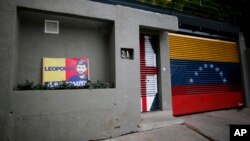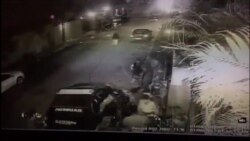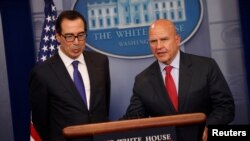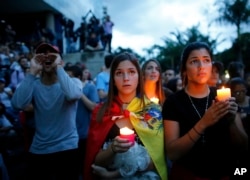Two Venezuelan opposition leaders who were on house arrest have been seized from their homes by state security forces, two days after a controversial vote creating a national assembly to rewrite the constitution.
The families of Leopoldo Lopez and Antonio Ledezma say the men were taken during the early morning hours Tuesday by agents with the Venezuelan intelligence service Sebin. Both families posted videos on Twitter of the men as they were taken, with Ledezma still wearing pajamas.
WATCH: Video showing agents removing opposition leader from home
Venezuela's Supreme Court said the two leaders were sent back to jail because "official intelligence sources" discovered they were planning to flee. The court also said Lopez and Ledezma violated the terms of their house arrest by "political campaigning" and "making statements to the media."
United Nations Secretary-General Antonio Guterres is concerned rising political tensions "will distance the country from a path conducive to finding a peaceful solution to the country's challenges," according to U.N. spokesman Stephane Dujarric. He said the secretary-general is urging Venezuelans, particularly those representing the government, to make all possible efforts to de-escalate tensions. Dujarric said Guterres reiterated the need for the government and opposition to begin negotiations, adding, the "only way forward is a political solution."
U.S. Acting Assistant Secretary of State Francisco Palmieri posted on Twitter that the U.S. is concerned about the detention of the men, saying it is "further evidence of the #Maduro regime's authoritarianism."
The two opposition leaders had each posted videos urging their followers to boycott last Sunday's vote to establish the assembly, which opposition forces said was an effort by President Nicolas Maduro to transform Venezuela into an authoritarian state.
Lopez and Ledezma, both of them former mayors, had been under house arrest for various charges. Lopez entered house arrest just weeks ago after spending three-and-a-half years in jail on charges of instigating violence during anti-Maduro street protests in 2014. Ledezma was convicted in 2015 on charges of plotting a coup against Maduro.
The detentions came hours after the United States imposed sanctions on Maduro over what it called his "illegitimate" election of an assembly to rewrite the constitution.
All of Maduro's assets in the U.S. are frozen and Americans are forbidden from doing any business with him.
Treasury Secretary Steven Mnuchin announced the sanctions Monday in Washington, calling Maduro a "dictator" who ignores the will of the Venezuelan people.
Maduro showed his apparent indifference to the sanctions late Monday, calling them a sign of President Donald Trump's "desperation and hate."
"I will not obey imperial orders. I do not obey any foreign governments. I'm a free president," Maduro said.
The sanctions against Maduro follow those imposed recently on a number of current and former senior Venezuelan officials.
Mnuchin would not comment on possible future sanctions, including a ban on Venezuelan oil exports. He said the U.S. will monitor the situation, but that "our objective is not to do anything to hurt the people of Venezuela."
Maduro presses ahead
The Maduro government appeared determined to go through with forming the 545-member constituent assembly, even before it releases final results of the election.
The government said more than 8 million people cast ballots; the opposition, which boycotted the vote, said the turnout was much lower. Reporters on the ground in Caracas said dozens of polling places were almost deserted Sunday.
If 8 million people voted, that would be less than half of all registered voters. Pre-election polls showed more than 70 percent of all Venezuelans opposed the assembly.
Details on what is likely to be included in a new constitution are unclear. Maduro has said it is the only way to pull Venezuela out of its severe economic and social crisis and stop the violence.
The opposition contended the vote was rigged, in order to pack the assembly with Maduro supporters who could dissolve the opposition-controlled national assembly and fire officials who disagree with the government. Maduro's opponents are demanding early presidential elections.
Sunday’s election was the bloodiest day in four months of anti-government protests, with at least 10 people killed in clashes around the country. More than 120 have died since early April.
The drop in global energy prices and political corruption together have destroyed Venezuela's once oil-rich economy. Gasoline, medicine, and such basic staples as cooking oil, flour, and sugar are scarce, and many Venezuelans cross into neighboring Colombia and Brazil to buy food.
Maduro has blamed the country's woes on what he calls U.S. imperialism and its supporters inside Venezuela. He has warned against intervention by the Organization of American States, saying that would surely lead to civil war.









